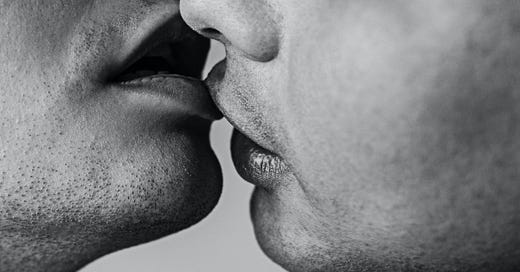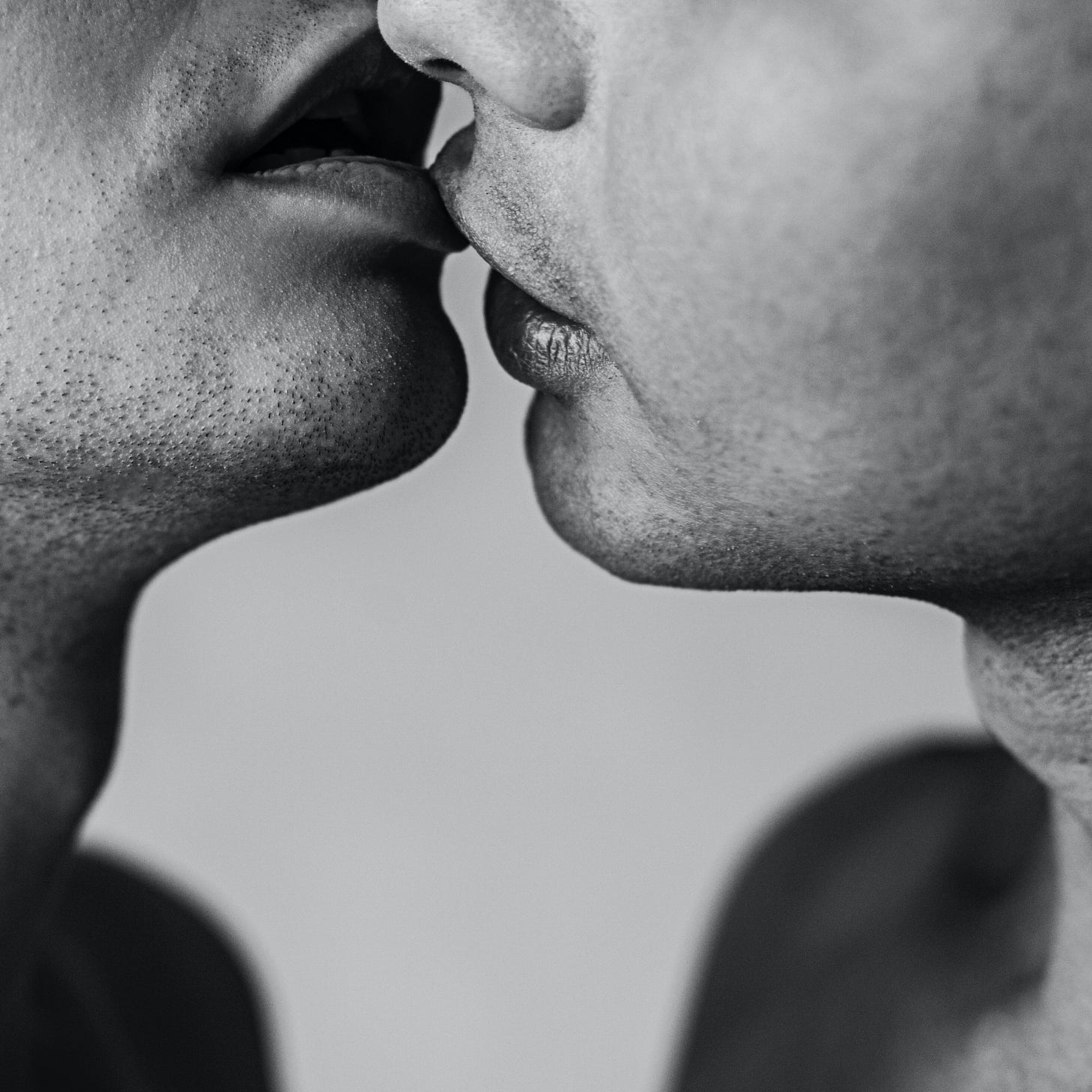It's cruising time, with Davey Davis
The author of X (2022), reflects on gay cruising and Guillaume Dustan's autofiction
“At night, you don’t talk about obvious things.” In Guillaume Dustan’s 1997 novel I’m Going Out Tonight—an account of a single evening at Gay Tea Dance, a nineties party hosted at Parisian nightclub La Loco—what is spoken of is, if not limited, then vastly simplified. At the nightclub, “you don’t talk about work, or money, or books, or records, or films,” says Dustan’s protagonist, who shares his name with the author. “You only act. Speech is action. Always on the lookout. Gestures charged with meaning.”
In I’m Going Out Tonight, as in Dustan’s sexy and beautiful first novel, In My Room, the distinction between night life and what his Guillaume character calls cruising time is never clear. PLUR aside, Guillaume’s night life is distinctly homosexual, usually white, almost exclusively cis; while straight people are sometimes encountered, they’re more of an atmosphere than a presence, a fart gas you must occasionally ford while moving from one DJ stage to the next. In La Loco, where Guillaume drinks, smokes, buys drugs, dances, greets friends, antagonizes enemies, plays with nipples, takes E shits, and catches catnaps, environment and mode become interchangeable. When a sexy bouncer lets him leave to get something to eat despite the party’s no re-entry rule, Guillaume is pleased by the efficiency with which the favor is negotiated. “All of this couldn’t have lasted more than five seconds,” he thinks. “That’s what I love about night life: communication reduced to the essential.” And if cruising is anything for Guillaume, it’s essential.
Cruising cis gay men is still somewhat new for me, and unsurprisingly my practice of it has changed how I experience its depiction on social media and in films and books. As many transfags discover after getting surgery or going on hormones, the world is a much cruisier place than we ever thought it could be.1 What once seemed to be an intimidating facet of male homosociality that must be opted into has revealed itself to me as practically ambient, though this hasn’t made it any easier to navigate as an FTM who rarely passes as anything at all. Mirroring the way Guillaume encounters gay night life as an almost constant scan for a potential fuck, Dustan’s direct, sometimes even clipped, approach to autofiction often spares interiority, instead emphasizing action.
“Speech is action. Always on the lookout. Gestures charged with meaning.” Guillaume makes faces to ward off the unattractive. He moves closer when he is curious, and away when he is not. He strokes shoulders and pinches asses. While in many ways superficial, a practice dependent on glances, proximity, touch, and vibes, cruising is not shallow. It may seem like a simple enough concept to the uninitiated—but then, a subculture’s social codes often do. Many transfags struggle to acclimate to this novel approach to getting laid, especially those of us with deep roots in dyke communities, where sexual negotiation tends to prioritize the verbal and unambiguous.2 I understand that, I really do. Personally, I’ve found the directness of cruising to be a relief. I don’t have to wonder if I’m wanted or not, not for long, anyway. And if I’m not wanted at the moment, there’s always someone else, or the future, or something.
How is Guillaume being passed over for awkwardness, for not being top enough, for wearing shoes that are too big all that different from an approaching guy seeing my chest scars and turning away?
“Eye contact,” says, or writes, Guillaume in I’m Going Out Tonight. “It took me a long time to realize that when someone looks at me, it’s because he’s interested. And yet I don’t look at anyone I’m not attracted to. I’m not interested in knowing that I’m attractive to someone who isn’t attractive to me. And when I find a guy attractive I’m actually kind of shy. Except when I really like them a lot. Then I can’t keep from hitting on them. So it all works out rather well.”
For all of the anxieties it incurs, Guillaume’s cruising time feels like a relief to me, too. It’s reassuring to be reminded that cis gay men aren’t born fully formed. That they, like Guillaume, had to learn how to be faggots with and through other faggots.
I’m Going Out Tonight demonstrates the emotional resilience demanded—perhaps even produced—by cruising culture. We see how often Guillaume’s attempts to cruise don’t work, leaving him frustrated, depressed, or embarrassed. Men draw near, only to lose interest when he dances poorly, or when his face comes into the light, or when they discover that he has chest hair (“Me and this other guy are the only ones who didn’t shave our chests,” Guillaume notes after a twink makes fun of his fur). Forehead wrinkles, strange expressions, monster cocks, too-tight holes, red hair, and already having a boyfriend are just a handful of the qualities that make him or the men around him undesirable to other men, and of course these change depending on the person, the night, the high, the moment. It’s impossible to deny that the full list of these unfuckable (though is this the same thing as undesirable?) qualities submits to the gravitational pull of white supremacy, misogyny, heteronormativity, and fatphobia—and so how is cruising any different from other modes of fulfilling desire, feeling connected, and having fun?
I don’t find what I’ve read of Dustan’s fiction to be sad, though Guillaume is not always happy, or even particularly satisfied. In his early-to-mid thirties, like me, he has anxieties about aging, about his body, about wanting to bottom. He has codependent relationships, sexual and otherwise. He sometimes doesn’t have enough money. His friends die of AIDS; he himself seroconverted years ago, and as he says in In My Room, he’s hard put to think of any gay male acquaintance who hasn’t. When he is passed over by other men, there is often disappointment or shame. And yet he fucks, and is fucked, by men he finds beautiful and exciting and desirable. Cruising is an emotional risk Guillaume takes over and over with the men around him, one for which he is richly rewarded.
How is Guillaume being passed over for awkwardness, for not being top enough, for wearing shoes that are too big all that different from an approaching guy seeing my chest scars and turning away? From a guy chatting me up until he notices I don’t have a dick? I’ve learned, like Guillaume, that there are always more men, and anyway we, as trans people, know we’ll always be in high demand.3 I hesitate to invoke the “abundance mindset” here, when this can quickly become, as so many queer men of all birth assignments will lament, a sexual production line, an endless swipe or compulsive scroll for bigger, better, and hotter. “I’m never getting old,” says Guillaume, and he is right, about his creator, anyway: Guillaume Dustan died in 2005, a month before turning 40. Perhaps abundance is not available to us, but his commitment to cruising time shows us that freedom certainly could be.
***
Davey Davis lives in Brooklyn. Find them on Twitter at @k8bushofficial and on Instagram at @stoneb1tch. Get their second novel, X, here.
Medical transition isn’t required to fuck gay cis men, but in my experience, it has made it a lot easier.
My life is still in those dyke communities, by the way. Being a fagdyke is transsexual privilege!
For sex, if nothing else.







this is so amazing. to be honest i didn’t even know cruising was something that any trans men did until i read this and another irresistible damage article where someone talked about it. its so exciting and quite healing to get confirmation that a lot of gay men find trans guys like me very desirable, and there’s hope for me yet. when i started transition so many people asked me how i would ever find a boyfriend and who would ever wanna have sex with me. theres this endless assumption that no man would ever find transmascs attractive, and its frustrating as fuck. so reading anything at all that pushes back against that assumption is a true gift to me
This really hits at a lot of things I've felt myself.